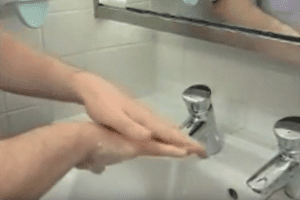
MRSA has been known to be Passed via Health Care Workers and Equipment. MRSA—Methicillin-resistant Staphylococcus aureus—has long been known to be passed via health care workers and equipment and is best known for its ability to fight off the effects of a growing array of antibiotics. Now, Science Daily reports that a preventative measure as […]

MRSA has been known to be Passed via Health Care Workers and Equipment. MRSA—Methicillin-resistant Staphylococcus aureus—has long been known to be passed via health care workers and equipment and is best known for its ability to fight off the effects of a growing array of antibiotics. Now, Science Daily reports that a preventative measure as simple as regular hand washing by hospital staff and visitors had significant positive effects on stemming the spread of the deadly super bug versus patient isolation.
Dr. Peter Wilson from University College Hospital, London just spoke at the Society for General Microbiology meeting in Harrogate and discussed a yearlong study that took place in two hospital intensive care units (ICUs). The study looked at a six-month period in the middle of the year in which ‘MRSA’ patients were not isolated, said Science Daily, versus ‘MRSA’ cross infection rates when patients were moved. The patients were tested for MRSA weekly, with hand hygiene by staff and visitors audited and urged, said Science Daily, which noted that there was no evidence of increased ‘MRSA’ transmission when patients were not moved and that moving seriously-ill MRSA patients can be dangerous and also involves extra hygiene measures.
In 2005—the last year when such figures are available—about 94,000 Americans developed MRSA with most of them infected in healthcare facilities. Previously limited to hospital and nursing home patients, MRSA is now striking and killing in communities. ‘MRSA’ now has two main strains, the traditional, hospital-acquired ‘MRSA’ (HA-MRSA), which, said EfluxMedia in an earlier report, is more dangerous due to its overwhelming antibiotic resistance; community-acquired MRSA (CA-MRSA) originates from strain ST8:USA300 and, while more potent, is a bit easier to treat, often not needing antibiotic therapy. Science Daily explained that ‘MRSA’ are Staphylococcus aureus bacteria that are resistant to the meticillin class of antibiotics.
“If a patient carrying ‘MRSA’ is critically ill, moving them to a single room is less of a priority than clinical care,” said Dr Wilson, quoted Science Daily. “If the criteria are strictly applied, compliance with hand hygiene practices on intensive care units is less than on a general ward because of the very high number of contacts per hour. Another study is needed in a general ward where a high level of compliance with hand hygiene is easier to achieve,” Dr. Wilson added.
MRSA is carried on the skin or in the nose and can affect others with carriers exhibiting no symptoms. ‘MRSA’ can be dangerous if it reaches the bloodstream or organs, but with early and proper diagnosis—when there is a small eruption on the skin and before ‘MRSA’ reaches the bloodstream—the infection is easily treated with general-purpose antibiotics, the sore is bandaged and kept clean, and the infection is cured. There is no down time and patients can resume activities with no risk of falling ill or contaminating others. Without treatment or with incorrect diagnosis and treatment, the infection spreads rapidly and can lead to respiratory failure and surgeries, attacking vital organs like the lungs and heart. Survivors are not always returned to their pre-MRSA condition, losing limbs, hearing, and full use of damaged organs.
If you’d like to know more about diseases go here: /diseases/
The personal injury attorneys at Parker Waichman LLP offer free, no-obligation case evaluations. For more information, fill out our online contact form or call 1-800-YOURLAWYER (1-800-968-7529).


